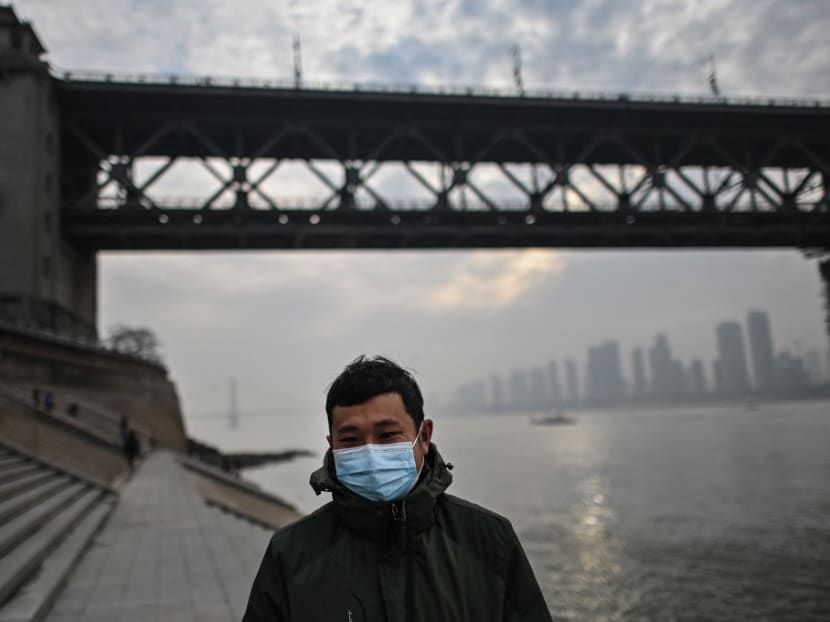Medical face masks make men look more attractive, UK study finds

A man wearing a face mask walks along the Yangtze River in Wuhan, China's central Hubei province. (File photo: AFP/Hector Retamal)
SINGAPORE: A study in the United Kingdom has found that men who wear medical masks are perceived as more attractive by members of the opposite sex.
Researchers at Cardiff University's School of Psychology found that medical masks made for more attractive coverings than cloth masks and notebooks. The least attractive faces were completely uncovered.
This was true whether the men were considered attractive or unattractive before the coverings were introduced, according to the study published in the journal Cognitive Research: Principles and Implications on Monday (Jan 10).
The results ran counter to findings of similar research conducted before the COVID-19 pandemic, said the authors of the study.
A 2016 study in Japan found a "sanitary-mask effect" showing that people associated medical masks with disease, perceiving masked faces as less healthy and hence less attractive.
"While medical masks might prime disease, they can also be seen as a sign of being responsible and caring citizens, which may positively impact perceived attractiveness," said the Cardiff University researchers.
This was in line with other research conducted during the pandemic that "shows faces wearing medical masks are considered more likely to be ill, but also more socially desirable and trustworthy".
THE EXPERIMENT
Researchers at Cardiff University conducted their experiment in February 2021, about seven months after face masks were made compulsory in places like supermarkets and public transport in the UK.
"Research carried out before the pandemic found medical face masks reduce attractiveness," said Dr Michael B Lewis, one of the study's authors, in an article on Cardiff University's website.
"We wanted to test whether this had changed since face coverings became ubiquitous and understand whether the type of mask had any effect."
Forty-three female psychology undergraduates were asked to rate 160 male faces for attractiveness on a scale of 1 to 7.
These 160 stimuli consisted of 40 male faces in four variations: Full uncovered face, covered by a notebook, covered by a cloth mask and covered by a medical mask.
The women were also asked whether they agreed that "face masks have become part of everyday life in the past year" and "the use of face masks is effective in preventing the spread of COVID-19". They showed high levels of agreement with the statements.
THE FINDINGS
Results showed that faces covered by medical masks were "significantly more attractive" than cloth masks. Faces covered in cloth masks were in turn "significantly more attractive" than uncovered faces.
The advantage for covered faces was consistent with general findings that covering facial features increases attractiveness, regardless of which features are covered and the "base attractiveness" of the face, said the study's authors.
But "there appears to be an advantage to medical masks beyond this", they added.
"The advantage for a cloth mask can be attributed to the effect of occlusion, but the effect of the medical mask goes beyond just hiding undesirable features," the authors said.
"It is possible that the additional advantage for medical masks comes from their associations with medical professionals."
They added that this effect "may only be present during the COVID-19 pandemic".
Dr Lewis said the research shows that the pandemic has "changed our psychology" in how mask-wearers are perceived.
"When we see someone wearing a mask we no longer think, 'That person has a disease, I need to stay away,'" he said.
"This relates to evolutionary psychology and why we select the partners we do. Disease and evidence of disease can play a big role in mate selection – previously any cues to disease would be a big turn off.
"Now we can observe a shift in our psychology such that face masks are no longer acting as a contamination cue."
BOOKMARK THIS: Our comprehensive coverage of the COVID-19 pandemic and its developments
Download our app or subscribe to our Telegram channel for the latest updates on the coronavirus pandemic: https://cna.asia/telegram







